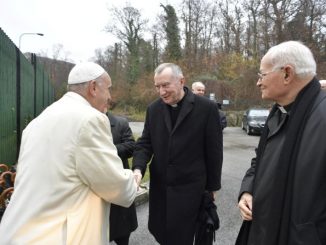
In Osorno, Pope’s investigators offer legal advice on responding to abuse

Osorno, Chile, Jun 12, 2018 / 04:02 pm (CNA/EWTN News).- The archbishop tasked with investigating the Chilean clerical abuse crisis said the main objective of his current visit to the diocese of Osorno is not only to express Pope Francis’ closeness to the local Church, but to help provide the legal structures needed to handle abuse accusations.
“In respect to our pastoral mission, we wish in first place to be a sign of the closeness of the pope to the people and Church of Chile,” Archbishop Charles Scicluna said in a June 12 statement read aloud to the press in Osorno.
Another goal of the visit, he said, is “to provide concrete technical and legal assistance to the diocesan curias of Chile, so that they can give adequate responses to each case of sexual abuse of minors committed by priests or religious.”
The archbishop stressed Francis’ particular closeness to the Diocese of Osorno, saying the visit will be carried out in a spirit “of service and of communion, in a context of prayer, of liturgical celebration and of mutual listening and cordiality.”
Scicluna, who heads the Archdiocese of Malta, is the Vatican’s top authority on sex abuse appeals cases. In addition to his post in Malta, Scicluna in 2015 was tapped by Francis to oversee the team in the Congregation for the Doctrine of the Faith charged with handling appeals filed by clergy accused of abuse. He served as the congregation’s Promoter of Justice for 17 years beginning in 1995, and is widely known for his expertise in the canonical norms governing allegations of sexual abuse.
The archbishop is currently on a June 12-19 pastoral mission to the Chilean Dioceses of Osorno and Santiago with Msgr. Jordi Bertomeu, an official of the Vatican’s doctrine office.
The two men, who have been tasked with advancing “the process of healing and reparation for victims of abuse” in Chile, will spend June 14-17 in the Diocese of Osorno, and the remainder of their time in the Archdiocese of Santiago.
In February the pair was sent to Santiago to investigate the clerical abuse crisis in Chile, which in the beginning largely surrounded accusations of cover-up on the part of Bishop Juan Barros Madrid, who was named to the Osorno diocese in 2015. His appointment was widely opposed, with many accusing the bishop of covering the crimes of notorious Chilean abuser, Fr. Fernando Karadima.
The Vatican announced Monday that Pope Francis has accepted Barros’ resignation and that of two other Chilean bishops. Every active bishop in Chile had submitted his resignation at the close of a May 15-17 meeting between the pontiff and the country’s bishops, during which Francis chastised them for systematic cover-up.
Francis had initially defended Barros, saying he believed the accusations against him were “calumny” during a visit to Chile in January. However, after new evidence was presented and news of old evidence resurfaced following his trip, the pope sent Scicluna and Bertomeu to Chile to investigate, resulting a 2,300 page report on the crisis which prompted the pope to pen a letter to Chilean bishops in April saying he had made “serious errors” in judging the case.
Since then, Pope Francis has met with all Chilean bishops and two groups of Chilean abuse survivors at the Vatican.
In his statement to the press, Scicluna entrusted the Osorno mission to the intercession of Our Lady of Mount Carmel, to the Venerable Servant of God Francisco Valdes Subercaseaux, first bishop of Osorno, and to Chilean Saints Alberto Hurtado and Teresa of the Andes.
Quoting from Pope Francis’ recent letter to Chilean Catholics, Scicluna said the pope’s appeal for them to take action “is not a functional resource or a gesture of goodwill; on the contrary, it is to invoke the anointing that as God’s people they possess.”
“With you, the necessary steps can be made for ecclesial renewal and conversion which healthy and long-term. You can generate the transformation that is so needed. Without you, nothing can be done,” the archbishop said.
Continuing to quote the text, he urged all Chilean Catholics “not to be afraid to get involved and walk impelled by the Spirit in search of a Church which is everyday more synodal, prophetic and hopeful; less abusive because it knows how to put Jesus at the center in the hungry, in the prisoner, in the migrant, in the abused.”
Scicluna closes his statement thanking Chilean Catholics for their welcome and for the opportunity that “in community, we will give in these days of grace to continue rebuilding justice and ecclesial communion in Chile, as Pope Francis has asked us all.”







